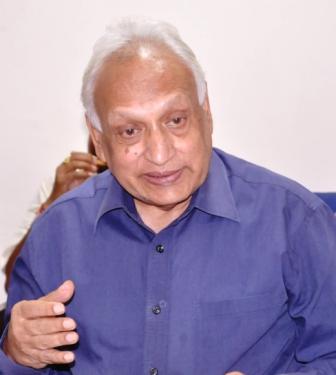
In general, the western scholars have looked upon diaspora as a tale of woe and depression: Prof. R.K. Jain
In general, the western scholars have looked upon diaspora as a tale of woe and depression: Prof. R.K. Jain
Prof. Brij Maharaj (BM) In Conversation with Prof. R.K. Jain (RKJ), Social Anthropologist and Diaspora Scholar
BM: Nice to speak to you again as it has been a long association. You've had a very distinguished career as a social anthropologist. How did it all start?
RKJ: Prof. Maharaj, it's my pleasure to talk to you again as we have been meeting in different parts of the world. You see, it started with my interest in Anthropology, History and English literature, which are the three subjects that I graduated in at Lucknow University in India. After that, I did my PhD from the Australian National University in Canberra in Anthropology and Sociology. At that time, I studied the Indian plantation workers, South Indian plantation workers in Malaysia, and that came out as a book both from Yale University Press, New Haven and from University of Black press in Kuala Lumpur.
BM: You were subsequently appointed as a teacher, university professor in different parts of the world, you can talk about those experiences?
RKJ: In today's age when people are doing YouTube, Twitter etc., I think my career was ready high bound in the sense that after doing my PhD from Australian National University, I went to Oxford to teach at the university as a University lecturer for Social Anthropology of South Asia. Since I had not done fieldwork in India at that time, I came to Madhya Pradesh in central India to conduct a study of the status and power equation in Madhya Pradesh, a state in India. But then I went back to Diaspora again because I went to Trinidad and Tobago as a visiting professor at the University of West Indies. Several years after completing my PhD from ANU, I again went to Australian National University as a visiting professor, again after having done my PhD work there, several years after that and then I have been consistently with the Jawaharlal Nehru University in New Delhi from which I retired in 2002. In the meantime, I have published at least half a dozen books on diaspora, Indian diaspora, as well as on Sociology and Anthropology.
BM: I think your main areas of interest was, what we call the old diaspora from my own personal experience and indentured diaspora, you have got experience in Tobago Trinidad refugee and South Africa, Malaysia. Can you offer some comparative reflections on these experiences?
RKJ – Right, I think there are people who have looked at, especially western scholars, I mean, there are exceptions, but in general, the western scholars have looked upon diaspora as a tale of woe and depression, whereas I find that people like Brij Lal who is from Fiji, he takes the view of challenging the schools. So, the old diaspora, despite adversities they stuck on to their roots can be adapted to the new circumstances in a very challenging way. Whereas the new diaspora, the NRIs and the people who are in the sort of new technology etc., these people have commodified nostalgia for India. So, I think the contrast between the old diaspora and the new diaspora, people talk of the new diaspora all the time, I think they should look at the old diaspora and the way in which they adapted and succeeded when making a distressing situation honorable for themselves.
(… for more details, please visit to our GRFDT YouTube channelhttps://www.youtube.com/watch?v=QdHSt6AcWa0&t=349s)
Interview Date: Sunday, Nov 27, 2016
Person Name: Prof. R.K. Jain